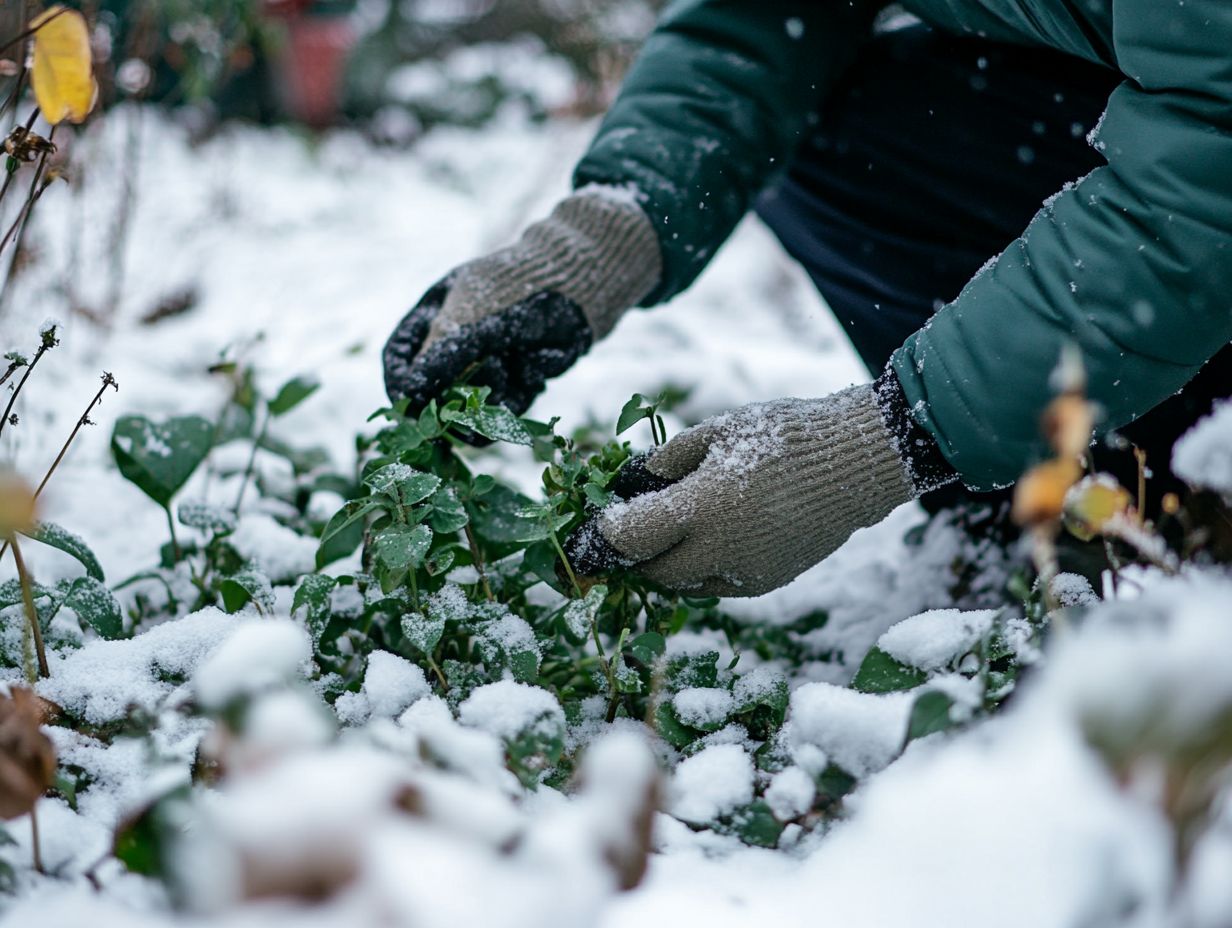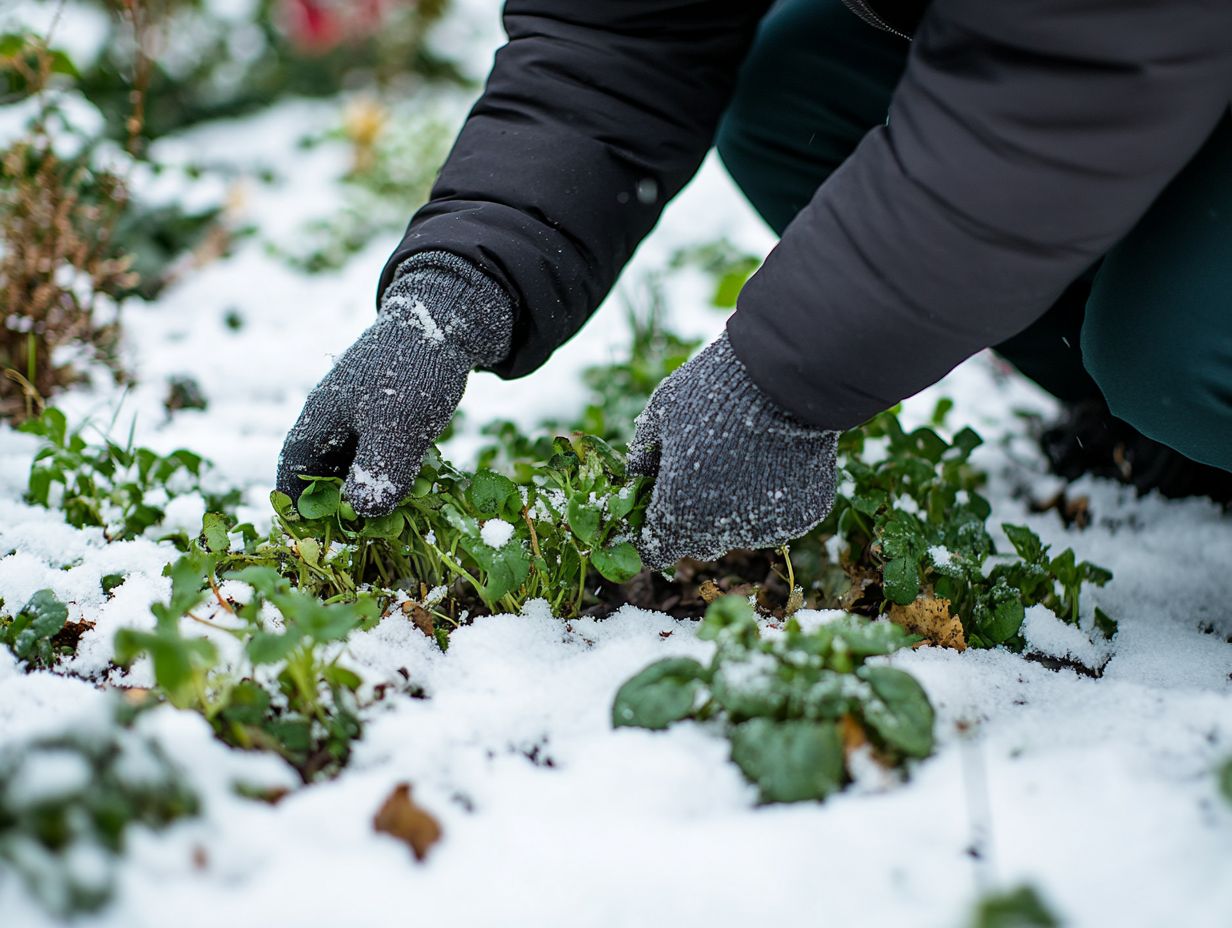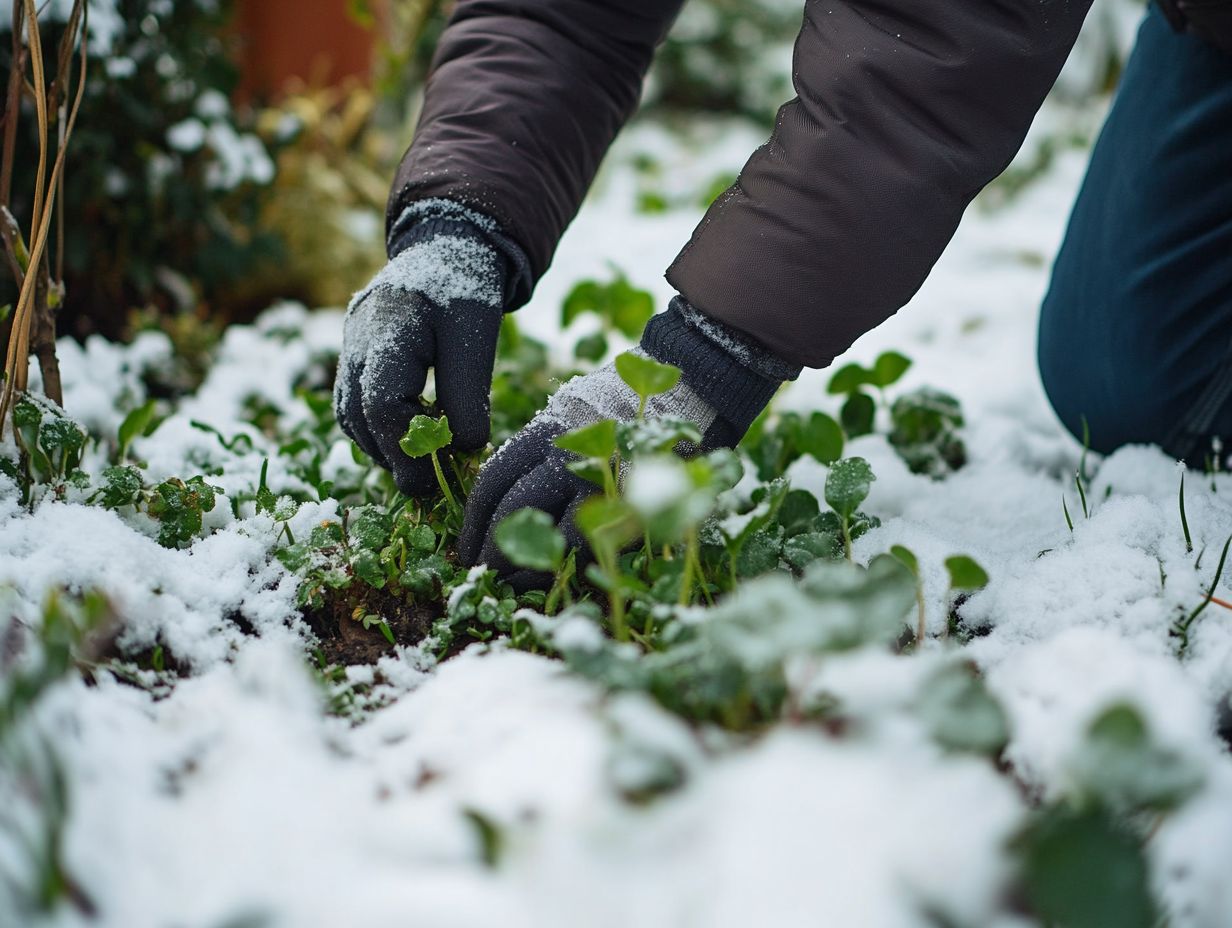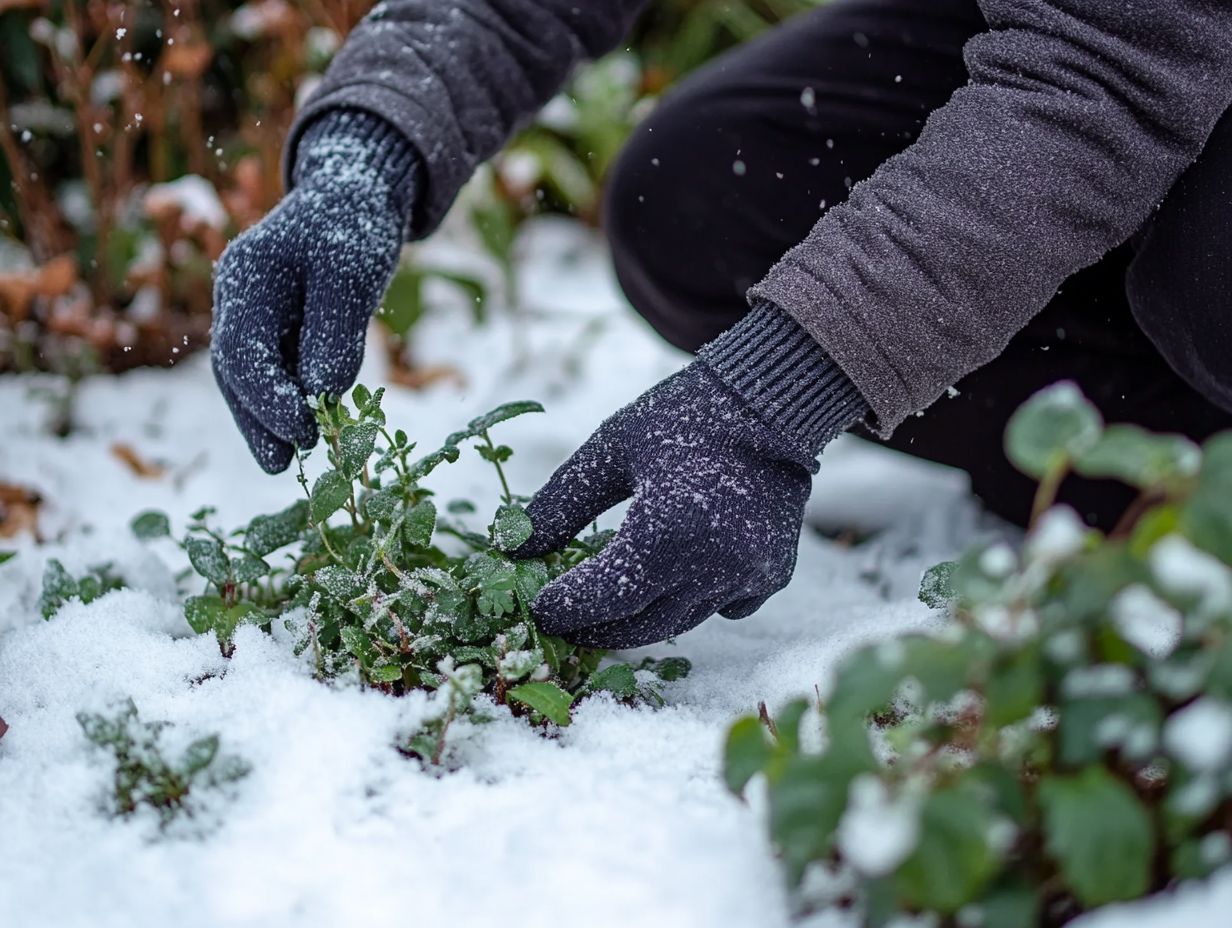Combating Winter Weeds: Tips and Tricks
Winter weeds can become a gardener’s unwelcome adversary, infiltrating your landscape just when you least expect it. Act now to protect your garden from these winter invaders!
To effectively manage these intruders, it s essential to understand the different types of winter weeds and their distinct characteristics. This article explores their impact on your garden while offering practical prevention strategies and efficient removal techniques.
Whether you prefer natural solutions or are open to chemical options, there are invaluable tips to help you reclaim your green space this winter. Start your weed management plan today!
Contents
- Key Takeaways:
- Understanding Winter Weeds
- Why Winter Weeds are a Problem
- Preventing Winter Weeds
- Removing Winter Weeds
- Alternative Methods for Weed Control
- Frequently Asked Questions
- What are winter weeds and why are they a problem?
- What are some common types of winter weeds?
- Want a Weed-Free Yard? Here’s How to Prevent Winter Weeds!
- What are some natural methods for controlling winter weeds, like Poa Annua?
- Are there any chemical options for combating winter weeds, especially in regions with excessive rainfall?
- What are some tips for maintaining a weed-free yard during the winter months?
Key Takeaways:

- Know the different types of winter weeds and their characteristics to effectively combat them.
- Winter weeds can harm your plants and landscaping, so take preventive measures.
- Use natural methods and proper removal techniques to control and eliminate winter weeds without harmful chemicals.
Understanding Winter Weeds
Understanding winter weeds is crucial for maintaining a vibrant lawn and garden during the colder months. These persistent plants often flourish under certain conditions, making them tricky to manage. For effective strategies, check out how to manage weeds in winter gardens.
You might encounter common winter weeds like Chickweed, Henbit, and Dandelion. These can invade your garden, disrupting its appearance and the health of your desired plants. Annual bluegrass and broadleaf weeds also compete fiercely with your grasses, siphoning off vital nutrients and moisture from the soil.
Recognizing these winter weeds is the essential first step in crafting an effective control strategy for managing their seed production and growth.
Types of Weeds and Their Characteristics
Several types of winter weeds present unique challenges in your garden.
Take Chickweed, for instance. It thrives in nutrient-rich, moist soil and showcases small, shiny leaves along with delicate white flowers that almost make it look appealing. Then there’s Henbit, easily identified by its square stems and striking purple flowers. If left unchecked, it can quickly take over your lawn. Both of these sneaky species stay green and continue growing even during colder months.
They reproduce with impressive speed through prolific seed production and vegetative means, spreading effortlessly. To combat these persistent winter invaders, you ll need to implement effective weed control methods. This includes proper lawn care practices and timely herbicide applications to prevent them from establishing a foothold in your landscape.
Why Winter Weeds are a Problem
Winter weeds pose significant challenges to maintaining a healthy lawn and garden. They compete fiercely with your desired grasses and plants for essential resources like nutrients and moisture in the soil.
This relentless competition can result in weaker grass growth and a less vibrant landscape. If not managed properly, winter weeds can multiply quickly, becoming a persistent problem that undermines your gardening efforts.
Recognizing the impact of these weeds is key to developing effective control and prevention strategies, including using pre-emergent herbicides, which are designed to stop weed seeds from germinating.
Impact on Plants and Landscaping

Winter weeds can harm your plants and landscaping. They compete for vital resources like moisture and nutrients.
Common winter weeds like chickweed and henbit thrive in the colder months. They can overshadow delicate flowers and disrupt your design.
These weeds can also harm soil health by depleting essential nutrients. This hinders the growth of your desired plants.
With effective lawn care and maintenance strategies like mulching and herbicide applications, you can tackle these issues. Doing so will keep your landscape healthy and beautiful.
Preventing Winter Weeds
Preventing winter weeds is a smart plan that saves you time and effort. You can build a strong lawn that resists weed invasion.
Use techniques like fertilization and soil management to discourage weed growth. Understanding the seasonal patterns of winter weeds helps you create a solid prevention plan, and incorporating tips for sustainable winter gardening can further enhance your efforts.
Best Practices for Weed Control
Implementing best practices for weed control significantly reduces winter weeds in your garden.
To tackle this challenge, consider various control methods suited to your lawn care needs. While chemical herbicides can yield fast results, apply them carefully at the right time.
Alternatively, organic options like vinegar and boiling water protect soil health. If you prefer a hands-on approach, manual removal is effective for small infestations.
Focus on removing weeds before they flower to prevent spreading. This keeps your lawn healthy and vibrant.
Removing Winter Weeds
Effectively removing winter weeds requires a strategic approach. For small infestations of broadleaf weeds like chickweed or henbit, manual removal works well.
Understanding the root systems of winter weeds like dandelion and poa annua helps ensure complete removal. Combining biological methods with good timing boosts your weed removal strategy.
Effective Removal Techniques

Effective removal techniques combine manual methods with chemical applications like weed killer. Tailor these methods to the types of weeds you face.
Use hand tools like a hoe or trowel to physically remove weeds. This not only helps with moisture management but also improves soil health.
Apply pre-emergent herbicides at the right time to prevent weeds from germinating. Early fall is ideal because the soil is still warm.
A holistic approach not only addresses immediate weed issues but also improves your soil’s long-term fertility and resilience.
Alternative Methods for Weed Control
Exploring alternative methods for weed control gives you effective and eco-friendly solutions. Use organic herbicides to manage winter weeds while reducing chemical use.
Natural and Chemical-Free Solutions
Natural and chemical-free solutions for weed control can be your pathway to managing winter weeds while nurturing a healthier environment for your garden. By embracing techniques like mulching, you not only suppress weed growth but also enrich the soil with organic matter, creating a thriving ecosystem.
Consider specific organic herbicides, like vinegar or corn gluten meal, which pack a punch against pesky weeds! These options effectively target unwanted plants without causing harm to beneficial insects.
Using natural pest controls, like certain nematodes or predatory insects, can help manage pests naturally. Together, these methods contribute to a greener lawn, reducing your reliance on synthetic products and fostering a harmonious balance within your garden ecosystem.
Frequently Asked Questions
What are winter weeds and why are they a problem?

Winter weeds are plants that grow during the colder months of the year, typically from October to March. They can be a nuisance because they compete with desirable plants for nutrients and water, and can also be invasive and difficult to control.
What are some common types of winter weeds?
Common types of winter weeds include dandelion, clover, chickweed, henbit, and annual bluegrass. These weeds can be found in lawns, gardens, flower beds, and other areas where there is moist soil and little competition from other plants.
Want a Weed-Free Yard? Here’s How to Prevent Winter Weeds!
The best way to prevent winter weeds is to maintain a healthy and dense lawn or garden. This includes regular mowing, fertilizing, and aerating to promote strong growth of desired plants. Be sure to pull any existing weeds to stop them from spreading seeds.
What are some natural methods for controlling winter weeds, like Poa Annua?
There are several natural methods for controlling winter weeds, including hand-pulling, using a weed digger, and applying a thick layer of mulch. For those interested in enhancing their gardening skills, exploring container gardening in winter can also be effective in removing existing weeds and preventing new ones from growing.
Are there any chemical options for combating winter weeds, especially in regions with excessive rainfall?
Yes, chemical herbicides are available for controlling winter weeds. However, it’s crucial to read and follow the instructions on the label carefully, as these products can be harmful to the environment and other plants if not used properly.
What are some tips for maintaining a weed-free yard during the winter months?
In addition to regular maintenance and weed control methods, here are a few tips for keeping your yard free of winter weeds: avoid overwatering, keep your yard free of debris and fallen leaves, and use a pre-emergent herbicide in the fall to prevent weed seeds from germinating.
Don’t let winter weeds take over your yard take action now!






